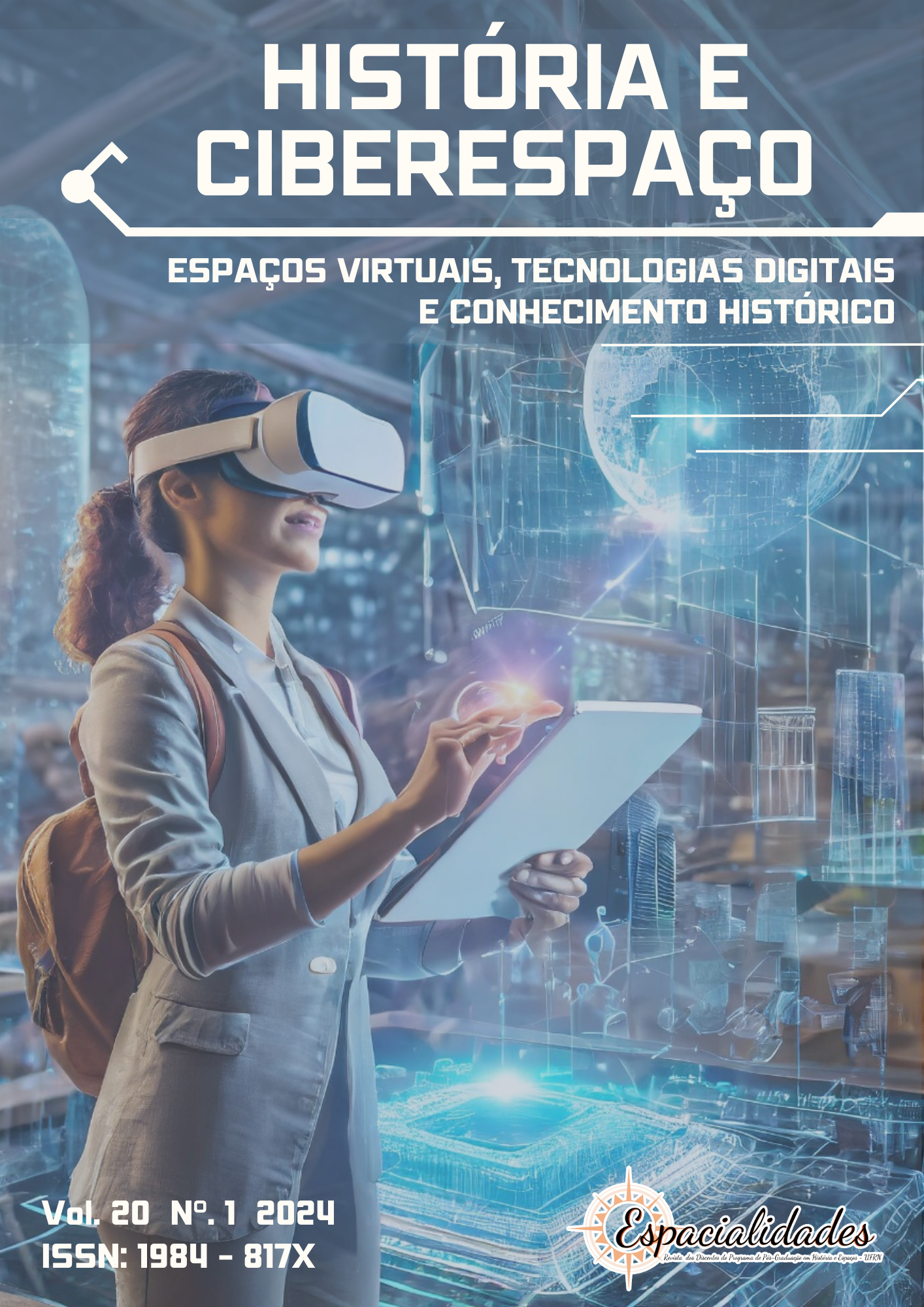OS LIMITES ENTRE A HISTÓRIA PÚBLICA E A HISTÓRIA DIGITAL:
O Tik Tok E Os Horizontes Possíveis
DOI:
https://doi.org/10.21680/1984-817X.2024v20n1ID36395Keywords:
Public History, Temporality; Neoliberalism; Platforms; Social media., temporality, neoliberalis, platforms, social mediaAbstract
This work aims to problematize the production of History for the internet, especially on the Tiktok platform, reflecting on the role of Public History in the decentralization of narratives about the past in academic and school spaces. Aiming to understand the complexity of networks and the platformization process, which we go through in the current stage of capitalism (CESARINO, 2022), we propose to adopt the methodology of the Maps of Communicative Mediations of Culture, prepared by Martin Barbero (1997). Discussing this totality of production of these contents, we point out some historiographical and technological demarcations as central to understanding this new format for disseminating History, its limits and consequently the role of the discipline in thinking about horizons of overcoming.
Downloads
References
ARAÚJO, V. L. DE. Historiografia, nação e os regimes de autonomia na vida letrada no Império do Brasil. Varia Historia, v. 31, n. 56, p. 365–400, maio 2015.
BELANDI , Caio. 161,6 milhões de pessoas com 10 anos ou mais de idade utilizaram a Internet no país, em 2022. Agencia IBGE Notícias, [S. l.], 09 nov. 2023. Disponível em: https://agenciadenoticias.ibge.gov.br/agencia-noticias/2012-agencia-de-noticias/noticias/38307-161-6-milhoes-de-pessoas-com-10-anos-ou-mais-de-idade-utilizaram-a-internet-no-pais-em-2022. Acesso em: 14 abr. 2024.
BENJAMIN, Walter. Magia e Técnica, Arte e Política: ensaios sobre literatura e história da cultura. São Paulo: Editora Brasiliense, 1996.
BENTES, Anna. A INDÚSTRIA DA INFLUÊNCIA E A GESTÃO ALGORÍTMICA DA ATENÇÃO. In: FERREIRA, Marcos Ribeiro; BOCK, Ana Mercês Bahia; GONÇALVES, Maria da Graça Marchina (org.). Estamos sob ataque!: tecnologia de comunicação na disputa das subjetividades. 1. ed. São Paulo: Instituto Silvia Lane, 2021. cap. 4, p. 42-59. E-book (366 p.).
BOLAÑO, César Ricardo Siqueira; VIEIRA, Eloy. ECONOMIA POLÍTICA DA INTERNET E OS SITES DE REDES SOCIAIS. Revista Eletrônica Internacional de Economia Política da Informação da Comunicação e da Cultura, São Cristovão, v. 16, n. 2, p. 71–84, 2014. Disponível em: https://periodicos.ufs.br/eptic/article/view/2168. Acesso em: 17 maio. 2024.
CANCLINI, Néstor Raúl García. Ciudadanos reemplezados por algoritimos. 1. ed. [S. l.]: Calas, 2019.
CARVALHO, Bruno Leal Pastor de. História Pública e redes sociais na internet: Elementos iniciais para um debate contemporâneo. Revista Transversos, Rio de Janeiro, v. 7, n. 7, p. 35–53, 2016.
CERTEAU, Michel de. A Escrita da História. Rio de Janeiro: Forense Universitária, 2010.
CESARINO, Letícia. Pós-verdade e a crise do sistema de peritos: uma explicação cibernética. Ilha Revista de Antropologia, Florianópolis, v. 23, n. 1, p. 73–96, 2021. DOI: 10.5007/2175-8034.2021.e75630. Disponível em: https://periodicos.ufsc.br/index.php/ilha/article/view/75630. Acesso em: 18 maio. 2024.
CESARINO, Letícia. O mundo do avesso: verdade e política na era digital. São Paulo: Ubu Editora, 2022.
DANTAS, Marcos; RAULINO, Gabriela. Trabalho da audiência e renda informacional no Facebook e YouTube. Revista Eletrônica Internacional de Economia Política da Informação da Comunicação e da Cultura, São Cristovão, v. 22, n. 1, p. 123–141, 2020. Disponível em: https://periodicos.ufs.br/eptic/article/view/12215. Acesso em: 17 maio. 2024.
DUGNANI , P. ENTRETENIMENTO E AUDIÊNCIA: A INFORMAÇÃO COMO MERCADORIA PARA OS INFLUENCIADORES NO BRASIL. Entropia, [S. l.], v. 8, n. 15, p. 53–75, 2024. DOI: 10.52765/entropia.v8i15.517. Disponível em: https://www.entropia.slg.br/index.php/entropia/article/view/517. Acesso em: 17 maio. 2024.
FISHER, Mark. Realismo capitalista: é Mais Fácil Imaginar o fim do Mundo do que o fim do Capitalismo?. São Paulo: Autonomia Literária, 2020.
GALINDO CÁCERES, Luis Jesús. Sabor a ti: metodologia cualitativa en la investigación social. Xalapa: Universidad Veracruziana. 1997.
KIRKPATRICK, David. O efeito Facebook: Os bastidores da história da empresa que conecta o mundo. Rio de Janeiro: Intrínseca, 2011.
LOWENTHAL, D.; HADDAD, T. L.; MALUF, R. técnica: M. COMO CONHECEMOS O PASSADO. Projeto História : Revista do Programa de Estudos Pós-Graduados de História, [S. l.], v. 17, 2012. Disponível em: https://revistas.pucsp.br/index.php/revph/article/view/11110. Acesso em: 10 maio. 2024.
MALERBA, J. Acadêmicos na berlinda ou como cada um escreve a História?: uma reflexão sobre o embate entre historiadores acadêmicos e não acadêmicos no Brasil à luz dos debates sobre Public History. História da Historiografia: International Journal of Theory and History of Historiography, Ouro Preto, v. 7, n. 15, p. 27–50, 2014. DOI: 10.15848/hh.v0i15.692. Disponível em: https://www.historiadahistoriografia.com.br/revista/article/view/692. Acesso em: 17 maio. 2023.
MALERBA, J. Os historiadores e seus públicos: desafios ao conhecimento histórico na era digital. Revista Brasileira de História, v. 37, n. 74, p. 135–154, jan. 2017.
MARTÍN BARBERO, Jesús. Dos meios às mediações: comunicação, cultura e hegemonia. Rio de Janeiro: UFRJ, 1997.
MENESES, S. Uma história ensinada para Homer Simpson: negacionismos e os usos abusivos do passado em tempos de pós-verdade. Revista História Hoje, [S. l.], v. 8, n. 15, p. 66–88, 2019. DOI: 10.20949/rhhj.v8i15.522. Disponível em: https://rhhj.anpuh.org/RHHJ/article/view/522. Acesso em: 17 maio. 2024.
SCHMIDT, Florian A. Trabalho e Inteligência Artificial Além da Mechanical Turk. In: GROHMANN, Rafael (org.). Os laboratórios do Trabalho Digital: Entrevistas. São Paulo: Boitempo, 2021. cap. 21, p. 143-146.
TILIA, Caroline de. Como o TikTok virou o novo Google para a Geração Z. 2024. Disponível em: <https://forbes.com.br/forbes-tech/2024/04/como-o-tiktok-virou-o-novo-google-para-a-geracao-z/>. Acesso em: 30 abr. 2024.
TURIN, Rodrigo. Tempos Precários: aceleração, historicidade e semântica neoliberal. Rio de Janeiro: Zazie, 2019.
Downloads
Published
How to Cite
Issue
Section
License
Copyright (c) 2024 Espacialidades Journal

This work is licensed under a Creative Commons Attribution-NonCommercial-ShareAlike 4.0 International License.
The submission of manuscripts to this journal implies the transfer, by the authors, of the rights of printed and digital publication. The authors own copyrights to the works they have created and grant to the journal the right to initial publication, with simultaneous work licensed under the Creative Commons License CC BY-NC-SA 4.0, and for publication rights. The authors can publish their work online in institutional/disciplinary repositories or in their own websites. Authors can only use the same results in other publications, clearly indicating this journal as the means of the original publication.
The author also agrees to submit the work to the publication rules of the Espacialidades Journal mentioned above.
Espacialidades Journal is an open access journal under the Creative Commons Attribution-NonCommercial-ShareAlike 4.0 International License (CC BY-NC-SA 4.0)




